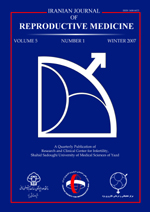
|
International Journal of Reproductive BioMedicine
Research and Clinical Center for Infertility, Shahid Sadoughi University of Medical Sciences of Yazd
ISSN: 1680-6433
EISSN: 1680-6433
Vol. 10, No. 3, 2012, pp. 201-208
|
 Bioline Code: rm12029
Bioline Code: rm12029
Full paper language: English
Document type: Research Article
Document available free of charge
|
|
|
International Journal of Reproductive BioMedicine, Vol. 10, No. 3, 2012, pp. 201-208
| en |
Prediction of assisted reproductive technique outcome in elevated early follicular phase follicle stimulating hormone with Mullerian inhibiting substance level
Safdarian, Leili; Khayatzadeh, Zahra; Djavadi, Ebrahim; Mahdavi, Atossa; Aghahosseini, Marzieh; Aleyasin, Ashraf; Fallahi, Parvin; Khayatzadeh, Sima; Ahmadzadeh, Arash & Larijani, Mohhamad Bagher
Abstract
Background: Detection of best predictor of ovarian reserve in patients with temporarily or consistently elevated early follicular phase serum levels of FSH is one of the most important goals in assisted reproductive technique (ART).
Objective: To evaluate whether high level of anti-mullerian hormone level is related to success of ART in patients with temporarily or consistently elevated early follicular phase serum levels of FSH.
Materials and Methods: Sixty three women underwent intracytoplasmic sperm injection (ICSI) with GnRH-agonist long protocol or intrauterine insemination (IUI) in a prospective cohort study. FSH, inhibin B and anti-Mullerian hormone (AMH) levels were measured in these women whom were divided to three groups (persistently elevated FSH, variably elevated FSH and, normal FSH level). Basal characteristics, stimulation parameters, and pregnancy occurrence were evaluated.
Results: AMH was significantly higher in women with persistently elevated early follicular phase FSH achieving pregnancy. Women with normal FSH did not have significant difference in AMH level between conceived and non conceived cycles. Women with only one elevated early follicular phase FSH achieving pregnancy did not have significant difference in AMH level with non pregnant women. Response to gonadotropin stimulation, recommendation to oocyte donation significantly differed between the groups.
Conclusion: This study has demonstrated that relatively young women with persistently or intermittently elevated day 3 FSH levels have diminished ovarian reserve and lower ART success. However, in women whose FSH levels were constantly elevated, AMH (not inhibin B) concentrations were significantly higher in ART cycles resulting in pregnancy. Therefore, AMH level is a good predictor of ART outcome in patients with elevated early follicular phase serum levels of FSH.
Keywords
Anti-mullerian hormone, In-vitro fertilization, Assisted reproductive technique, Inhibin B
|
| |
© Copyright 2012 - Iranian Journal of Reproductive Medicine
Alternative site location: http://www.ijrm.ir
|
|
